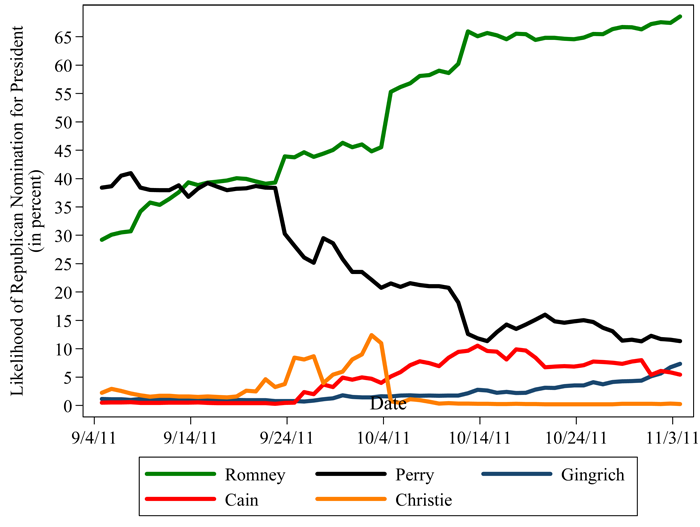 The Ticket
The TicketTaking a serious look at Newt Gingrich
Former House Speaker Newt Gingrich has long insisted he belongs in the top tier of Republican candidates for the 2012 nomination--even in the wake of campaign staff implosions and embarrassing reports of his free-spending patronage of Tiffany's.
And as Gingrich gains noticeable momentum in the polls, the prediction markets are also starting to take him more seriously. Gingrich's stock in prediction markets such as Intrade has been gaining ground over the past few weeks, but took a sharp upward turn on Monday as the media broke a round of damaging allegations about Herman Cain: claims of sexual harassment dating to Cain's 1990s tenure at the National Restaurant Association, together with reports of campaign fundraising violations.
In the short term, the unorthodox Cain campaign has yet to show signs of flagging in the face of the charges--a new Washington Post/ABC poll shows him essentially tied with Mitt Romney atop the GOP field. But a look at the larger picture via the prediction markets shows that Cain's likelihood of actually winning the nomination is getting smaller each day. The reason that prediction markets have been so skeptical of Cain's success, from the beginning, is that no one has vetted him--meaning that the greater public scrutiny that comes with a higher-profile candidacy would produce unwelcome revelations such as the harassment charges. The insider handicappers who typically participate in prediction markets have also noted that Cain's command of social, economic and foreign policy issues comes across as amateurish.
Cain's recent troubles have created a significant opening for Gingrich, since many GOP primary voters are continuing to search for an alternative to Romney--and since the last vetted anti-Romney candidate, Texas Gov. Rick Perry, is contending with plenty of campaign woes of his own.
Gingrich is now the third most likely Republican nominee--still way behind Romney, but just behind a still falling Perry. Thanks to his tenure as House Speaker, Gingrich is the most thoroughly vetted of all of the potential nominees. Of course, Americans have notoriously short-term memories when it comes to politics; Gingrich resigned in 1998 amid very low popularity following the government shutdowns of 1995 and 1996 and the perceived hypocrisy surrounding the Monica Lewinsky scandal and President Clinton's impeachment. You can still expect his far from scandal-free personal life to be a major issue for the religious right as social conservatives weigh his candidacy going forward.
Yet, despite such baggage, the good news for Gingrich is that the field of likely anti-Romney candidates is steadily thinning--leaving him the likeliest candidate for reconsideration among conservative GOP voters. Ron Paul is a libertarian and while he has maintained consistent support and attracted a passionate following, he has not broken into the mainstream of Republican conservatism. Jon Huntsman has been running as a moderate, gaining no traction with the Republicans. And Michelle Bachman and Rick Santorum have positioned themselves as hardline conservative candidates--in a way that has so far prevented them from garnering serious support outside the social-conservative camp.
In the chart below, you can examine how, over the course of the past two months, the prediction markets have handicapped the chances of the top four GOP contenders--together with New Jersey Gov. Chris Christie, who has disavowed repeated calls for him to join the race, and endorsed Romney.
And you can continue to stay current with the real-time likelihood that the prediction markets fix for all GOP candidates here.
David Rothschild is an economist at Yahoo! Research. He has a Ph.D. in applied economics from the Wharton School of Business at the University of Pennsylvania. His dissertation is in creating aggregated forecasts from individual-level information. Follow him on Twitter @DavMicRot and email him at PredictionBlogger@Yahoo.com.
More popular Yahoo! News stories:



